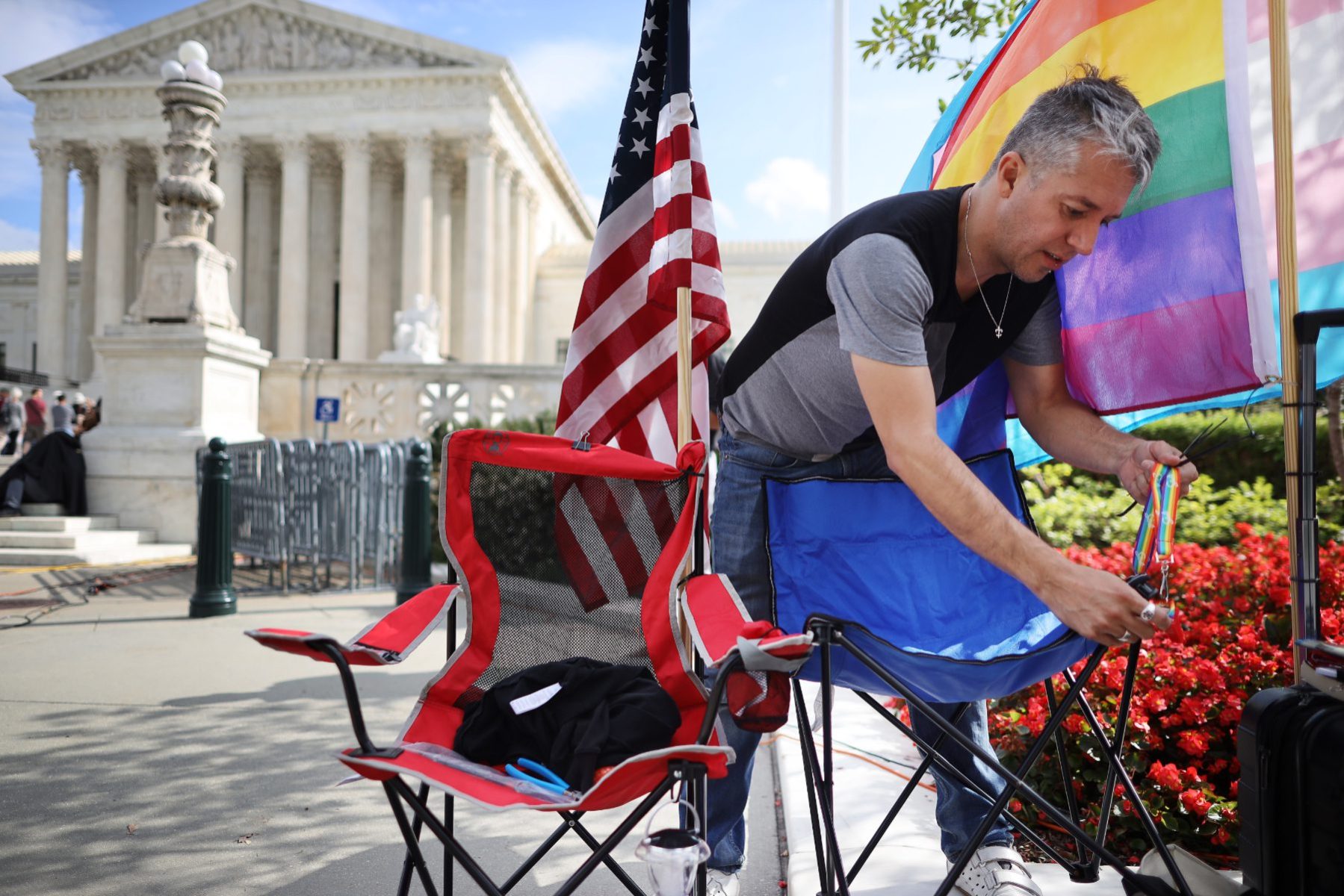Bostock v. Clayton County, the landmark Supreme Court case that found LGBTQ+ people are protected against workplace discrimination, has quickly become a crucial support in legal fights for LGBTQ+ rights since it was decided in 2020. The decision has been cited in at least 250 other cases, according to the ACLU, and it serves as the backbone of the Biden administration’s Title IX interpretation, as well as support for interpretations of the Violence Against Women Act, the Affordable Care Act and protections added to the Fair Housing Act.
The role of Bostock in these cases also makes it a potential target for legal pushback.
Last month, a federal judge in Tennessee issued an injunction preemptively blocking the Biden administration from enforcing its guidance to expand LGBTQ+ protections under Title IX, which prohibits sex discrimination in schools. While the ruling only applies to the 20 states that joined the lawsuit — and experts say the suit’s argument flies in the face of legal precedent — it is one recent example of court battles that aim to limit Bostock’s reach, several experts tell The 19th.
LGBTQ+ legal observers expect more battles in front of conservative courts to attempt to limit the scope of Bostock.
“We’re going to have to fight hard against that,” said Shannon Minter, legal director of the National Center for Lesbian Rights (NCLR). “We’re going to have to litigate this issue all over the country.” Hopefully most courts will agree that the reasoning in Bostock applies in schools and to trans and LGBTQ+ students, he said.
Minter said he found the Tennessee case, which was decided by U.S. District Judge Charles Atchley, to be troubling.
“I think this decision is completely wrong, poorly reasoned, incorrect,” Minter said. “But it is a warning sign about how aggressively we’re going to have to fight because our opponents are fighting no holds barred to strip every right and protection from LGBTQ+ people, including transgender students.”
LGBTQ+ experts say that since the Supreme Court clearly laid the groundwork in Bostock for its protections to apply in other scenarios — due in part to the traditional legal link between Title VII and Title IX, as well as the court’s explanation of how sex discrimination must be applied to discrimination against gay or trans people — it is concerning and baffling that a judge would side with the plaintiffs in the Tennessee lawsuit.
“By claiming that Bostock doesn’t protect LGBTQ+ people, this judge has sent a very public and very wrong message about what our nondiscrimination laws do for us, and that’s a very real harm,” said Chris Erchull, staff attorney at GLBTQ Legal Advocates & Defenders (GLAD).
Aaron Ridings, deputy executive director for public policy and research at GLSEN, which advocates for LGBTQ+ students, said that the Tennessee injunction is one part of broader attacks on LGBTQ+ rights that ultimately harm students and which, he fears, means they’re more likely to be exposed to homophobia, transphobia, or racism at school.
Atchley’s decision creates a fraught situation for LGBTQ+ people in many of the states that joined the lawsuit. Tennessee and its fellow plaintiff states argued that the Biden administration’s interpretation of Title IX keeps them from enacting or enforcing anti-trans laws — even though not all of them have managed to pass anti-trans bills into law, said Ezra Ishmael Young, who teaches constitutional law at Cornell Law School.
“They’re trying to carve out space so they could have these laws in the future. And they’re saying until we get the political power to pass these laws, which they might never have, we don’t want the federal government doing what it’s doing. That makes no damn sense and that’s destructive,” Young said.
The immediate legal effects of the Title IX injunction are unclear, especially since the latest guidance from the White House has yet to be formalized — and the DOJ has not yet signaled its response. Until then, some experts say the Education Department should still be able to keep investigating anti-trans harassment in schools, and LGBTQ+ people can still sue their employers over discrimination.
In June, the Education Department’s office for civil rights found that a California school district had violated Title IX due to its failure to respond to a transgender student being repeatedly harassed by another student. The investigation led to the school district agreeing to update its harassment policies in a voluntary resolution agreement.
This new injunction should not prevent the Education Department from continuing to take such actions in states that are involved in the Tennessee lawsuit, Young and Erchull said. The agency has yet to respond about how it will continue such efforts following the judge’s order.
“It’s really hard to see what it is that the court’s enjoining here or what will change as a result of it,” Erchull said, especially since LGBTQ+ people can still sue their employer if they believe they were discriminated against. Schools can also still be sued by students or their parents, Minter said.
In the meantime, more lawsuits challenging Title IX’s LGBTQ+ protections have been filed. Last week, 22 states — again led by Tennessee’s attorney general — sued the U.S. Department of Agriculture for requiring states receiving federal nutrition assistance money to investigate discrimination based on gender identity and sexual orientation, as well as tasking them to update nondiscrimination policies. The administration issued the guidance based on Biden’s Title IX interpretation, as supported by Bostock.
Also last week, Florida’s education commissioner sent a memo urging the state’s superintendents and school boards to ignore the Biden administration’s Title IX interpretation, including that guidance from the USDA. As part of his reasoning, Florida education commissioner Manny Diaz cites the Tennessee lawsuit that just won a preliminary injunction.
The agency’s Title IX interpretation still has a long way to go before it becomes an enforceable rule, as it is still going through public comment. Even after the rule is finalized, the grounds to challenge it would be limited, Young said.
Whether Atchley’s injunction over the new Title IX guidance will be appealed by the Justice Department and reach the U.S. Court of Appeals for the 6th Circuit is also an open question — and LGBTQ+ experts differ on how they would expect the court to respond. Through a spokesperson, the DOJ declined to comment, citing pending litigation.
Anya Marino, clinical instructor at Harvard Law School’s LGBTQ+ Advocacy Clinic, said she would be “very surprised” to see the court ignore previous decisions made outside of Bostock that affirmed that discrimination on the basis of gender noncomformity does constitute sex stereotyping and violates either Title VII or Title IX.
“But it’s even more astounding to me that a court would create such a narrow carveout regarding the rules imparted by the Supreme Court in Bostock,” she said, referring to the Tennessee judge’s decision.
Anthony Michael Kreis, who teaches constitutional law and employment discrimination at the Georgia State University College of Law, said that while the outcome of the Tennessee judge’s ruling if appealed to the Sixth Circuit is unclear, he is concerned about the current hostility against LGBTQ+ rights.
“I think we’re dealing with a much more hostile environment generally against LGBTQ rights, which is not helpful for the litigation environment,” Kreis said. That hostility, seen in anti-trans and anti-LGBTQ+ bills and potentially after the overturning of Roe v. Wade, has left him feeling more pessimistic than he has in a long time.
“That makes me very uneasy, but whether that translates into more hostile rulings from federal judges, I think is a different question, and one that remains to be seen, but is certainly not an environment that I would want to litigate in,” he said.







